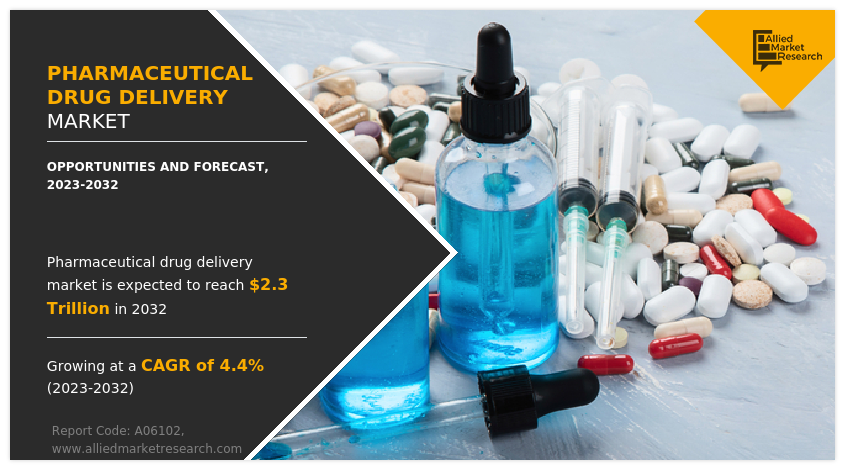The landscape of the global pharmaceutical drug delivery market has experienced substantial growth and transformation in recent years. As of 2022, the market reached a significant valuation of $1,498.72 billion, indicating the industry’s robust health and potential. Projections for the market’s trajectory are even more remarkable, with estimations pointing towards a staggering value of $2,307.27 billion by the year 2032. This growth is underpinned by a Compound Annual Growth Rate (CAGR) of 4.4% forecasted to persist from 2023 to 2032.
Pharmaceutical drug delivery stands as a pivotal component of modern medical practices, as it enables the precise and targeted administration of medications and therapeutic substances. Its ultimate goal is to attain optimal therapeutic outcomes while simultaneously ensuring patient safety, minimizing adverse effects, enhancing bioavailability, and promoting patient compliance. Achieving these objectives necessitates the development and implementation of a diverse array of methodologies, systems, and technologies.
Among the foremost avenues of pharmaceutical drug delivery is the oral route, facilitated through formats such as tablets, capsules, and liquids. This approach grants patients a familiar and convenient means of medication consumption. In addition, injectable delivery methods offer rapid and efficient drug administration, ensuring that therapeutic agents promptly reach their intended destinations. The innovation of transdermal delivery, marked by patches applied to the skin, has also revolutionized drug delivery by offering controlled and sustained release over extended periods. Moreover, topical delivery, involving applications to the skin or mucous membranes, provides localized treatment and further expands the repertoire of drug delivery options. Beyond these conventional methods, there exists a spectrum of specialized approaches that cater to unique therapeutic requirements.
Central to the success of pharmaceutical drug delivery is its capacity to provide patients with precisely calibrated doses of medications, thereby optimizing therapeutic effects. This precision significantly reduces the potential for adverse effects, ultimately fostering a safer treatment environment. Additionally, enhancing the bioavailability of therapeutic agents through effective drug delivery mechanisms empowers healthcare practitioners to achieve therapeutic objectives with lower doses, subsequently minimizing the risk of toxicity.
The seamless integration of pharmaceutical drug delivery strategies holds the promise of improving patient compliance, a vital factor in the efficacy of treatments. By offering convenient and patient-friendly administration methods, individuals are more likely to adhere to prescribed regimens, leading to better treatment outcomes.
𝐏𝐮𝐫𝐜𝐡𝐚𝐬𝐞 𝐏𝐫𝐞𝐦𝐢𝐮𝐦 𝐂𝐨𝐩𝐲 𝐨𝐟 𝐏𝐡𝐚𝐫𝐦𝐚𝐜𝐞𝐮𝐭𝐢𝐜𝐚𝐥 𝐃𝐫𝐮𝐠 𝐃𝐞𝐥𝐢𝐯𝐞𝐫𝐲 𝐌𝐚𝐫𝐤𝐞𝐭 𝐆𝐫𝐨𝐰𝐭𝐡 𝐑𝐞𝐩𝐨𝐫𝐭 𝐚𝐭: https://www.alliedmarketresearch.com/pharmaceutical-drug-delivery-market/purchase-options
